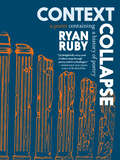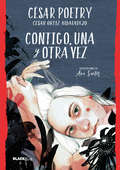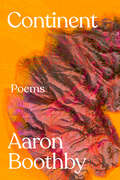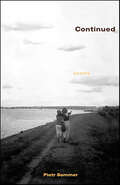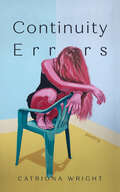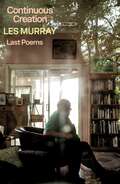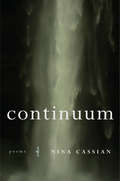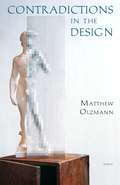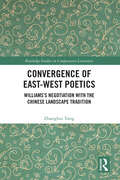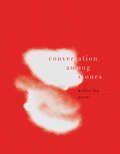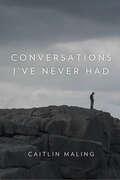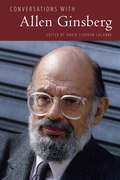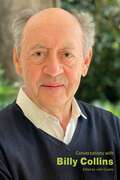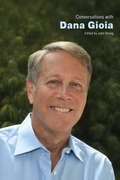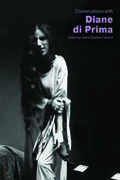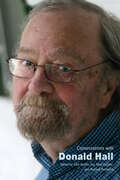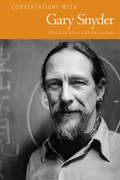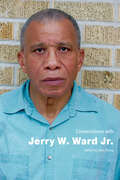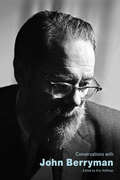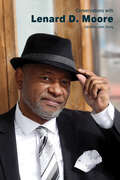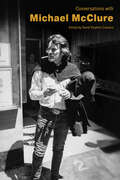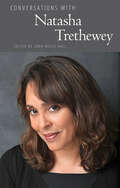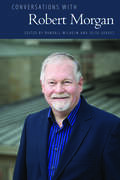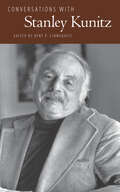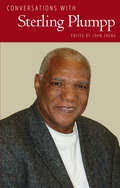- Table View
- List View
Context Collapse: A Poem Containing a History of Poetry
by Ryan RubyLiterary critic Ryan Ruby uncovers the secret history of poetry in a mock-academic verse essay filled with wit and wisdom.One of Publishers Weekly's Best Books of 2024Prophet. Entertainer. Courtier. Criminal. Revolutionary. Critic. Scholar. Nobody. Epic in sweep, Context Collapse is the secret history of the poet—from Bronze Age Greece and Renaissance Italy to the cafés of Grub Street and the Latin Quarter, from the creative writing departments of the American Midwest to the boardrooms of Silicon Valley. Cheekily introducing academic discourse, media studies, cybersemiotics, literary sociology, and heterodox economics into his blank verse study of poetry, Ruby traces the always delicate dance between poets, their publishers, and their audiences, and shows how, time and time again, the social, technological, and aesthetic experiments that appear in poetic language have prefigured radical changes to the ways of life of millions of people. It is precisely to poets to whom we ought to turn to catch a glimpse, as Shelley once put it, of the &“gigantic shadows futurity casts on the present.&”
Contigo, una y otra vez (Colección #BlackBirds)
by César PoetryCésar Poetry presenta una novela sensible y elegante sobre el amor, la soledad y la felicidad, acompañada de las bellas ilustraciones de Ana Santos. La vida da muchas vueltas, pero, a veces, no nos damos cuenta de que la Tierra es redonda y siempre hay una oportunidad para volver a empezar. <P><P>Y quien realmente merece la pena está dispuesto a darlas contigo, sujetando todos y cada uno de tus miedos. Eso es lo que encontrarás en estas páginas. Aquí dentro podría contarse tu historia, la historia de cómo las pequeñas cosas hacen que el corazón nos lata un poquito más deprisa. Antes de comenzar a leer este libro, deberías preguntarte lo siguiente: Si mañana todo acabara, ¿repetirías lo que estás haciendo hoy con esa persona? Yo lo tengo claro: «Contigo, una y otra vez.» <P>#BlackBirds un refugio íntimo de papel. Libros irresistibles para leer, guardar y compartir. Es una nueva colección de espíritu indie y juvenil con contenido de no-ficción moderno: poesía, microcuentos, reflexiones, diarios... Su diseño rompedor y la colaboración de conocidos ilustradores, bloggers e instagrammers dan vida a estos libros que son pequeñas obras de arte, caprichos, que todos querremos tener, leer y atesorar.
Continent: Poems
by Aaron Boothby&“These poems buckle and drift in ways that reveal their continental scope. The I of these poems offers its critical lament, but it never overlooks beauty.&” --Kaie KelloughThe poems in Continent ask to be done with presuming, knowing, and defining. They trace maps laid across lands and peoples by force, voiced by a speaker both engaged in attendingto this ongoing violence and unable to escape complicity with it. Urgent, visceral, emotionally striking, Aaron Boothby&’s debut collection asks the question: how can we see, listen, and feel an ongoing catastrophe and look for what is beyond it?
Continued: Poems (Wesleyan Poetry Series)
by Piotr SommerContinued is a selection of poems by Piotr Sommer, spanning his career to date. A kind of poetic utterance, these "talk poems" are devoid of any singsong quality yet faithfully preserve all the melodies and rhythms of colloquial speech. Events and objects of ordinary, everyday life are related and described by the speaker in a deliberately deadpan manner. Yet a closer look at the language he uses, with all its ironic inflections and subtle "intermeanings," reveals that the poem's "message" should be identified more with the way it is spoken than with what it says. The poems in this volume were translated into English with the help of other notable poets, writers, and translators, including John Ashbery, D.J. Enright, and Douglas Dunn.
Continuity Errors
by Catriona WrightCBC BOOKS CANADIAN POETRY COLLECTIONS TO WATCH FOR IN SPRING 2023Feminist poems both serious and absurd that question our obsession with productivity instead of with care.Continuity Errors questions the privileging of work and productivity over rest and care from an ecological and feminist perspective. Written before and immediately after the birth of her first child, these poems try to imagine the future her son will inherit. Encounters with an unusual cast of characters – including lonely cryptids, unrepentant grifters, and persistent ghosts – provide incomplete answers, and while the continuity errors keep multiplying around her, Wright pauses to consider whether our devotion to innovation is keeping us stuck."Catriona Wright's Continuity Errors is a book of snaking moves and sneaking intellect, a book of style and fortitude and sass. Wright's always sharp and often eerie interrogations lead us through a world of cryptocurrency, grunt work, predictive policing, extinction, haute cuisine, billboard ads, smoke breaks, breast pumps; these are poems for our moment of onslaught and bewilderment that, having had the world forced down their throats, spit back." – Natalie Shapero, author of Popular Longing
Continuous Creation: Last Poems
by Les MurrayThe final collection of poems by the great Australian poet Les Murray, Continuous CreationWe bring nothing into this worldexcept our gradual abilityto create it, out of all that vanishesand all that will outlast us.In Continuous Creation, the final collection from Les Murray, the preeminent poet of modern Australia recalls moments from his youth and wryly observes the changing world, moving back and forth through time and history with characteristic curiosity and an ever-fresh commitment to capturing the rhythms of life in verse. This collection displays Murray’s miraculous ability to reinvent language in order to plant his and our reality on the page, whether he writes about the Australian landscape (“Kangaroo sleeping / ahead on the road turns out / to be twigs and leaves”) or unsold books sitting in department stores.Continuous Creation demonstrates, once more, that Murray was one of the great poets of the English language. As Joseph Brodsky said, he was, “quite simply, the one by whom the language lives.”
Continuum: Poems
by Nina Cassian"The poems in this work show Cassian to be . . . a poet who can work miracles with language."--Library Journal Spanning nearly sixty years, these poems--both new English compositions and Nina Cassian's translations of her work in Romanian--blend her gallows humor with an engagement with the human experience.
Contradictions in the Design
by Matthew OlzmannThese political poems employ humor to challenge the cultural norms of American society, focusing primarily on racism, social injustices and inequality. Simultaneously, the poems take on a deeper, personal level as it carefully deconstructs identity and the human experience, piecing them together with unflinching logic and wit. Olzmann takes readers on a surreal exploration of discovery and self-evaluation.
Convergence of East-West Poetics: Williams’s Negotiation with the Chinese Landscape Tradition (Routledge Studies in Comparative Literature)
by Zhanghui YangThe present book examines William Carlos Williams’s negotiation with cultural modes and systems of the Chinese landscape tradition in his landscape writing. Focusing on Walliams’s landscape modes of landscape with(out) infused emotions, the book builds a linkage between their interactions with Chinese landscape aesthetics and shows how these conversations helped shape Williams’s cross-cultural landscape poetics. The exploration of Williams’s experiment with the Chinese serene interplay of self and landscape, the interfusion of scene and emotion, an idea of seeing from the perspective of Wang Guowei’s theory of jingjie, and the poetic space of frustration and completion in the context of space and human geography, expand the understanding of a cross-cultural landscape tradition developed by Williams through bringing into focus the convergence of East-West poetics.
Conversation Among Stones
by Willie LinAwakening to histories personal and social, Conversation Among Stones is a meditation on memory and identity. Through fields of wild grass, restless seascapes, and cities tinged with sand, Willie Lin's debut collection of poetry questions what can remain and what must be pared away in our search for truth. Conversation Among Stones speaks both to the inanimate—misremembered histories, photographs, the dead—and to the voices in our daily lives that reverberate with disagreement and confusion. Punctuated by doubt and resistant to easy transformations, these poems listen and revise. With striking restraint and simultaneous abundance, these poems attempt to reconcile the desire for answers with the necessity of not knowing.Turn by turn, this collection catalogs moments of approach, fervor, and strife and carries us into a profound quest for understanding: “And that was one conviction: / that we must be to one another / what the world is not / to us.”
Conversations I've Never Had
by Caitlin MalingCaitlin Maling's first collection is at heart a poetry of place. Cervantes, Donnelly River, Yallingup, Fremantle, Leonora, and beyond are richly evoked in poems ranging stylistically from accomplished mature lyrics and the confessional to narratives of raw power and feeling. Restlessly questioning and frequently allusive, slipping between promise and possibility, Maling's poems are invested in the actuality of the world, exploring the landscapes of memory and the brief moment of now.
Conversations with Allen Ginsberg (Literary Conversations Series)
by David Stephen CalonneAllen Ginsberg (1926–1997) was one of the most famous American poets of the twentieth century. Yet, his career is distinguished by not only his strong contributions to literature but also social justice. Conversations with Allen Ginsberg collects interviews from 1962 to 1997 that chart Ginsberg’s intellectual, spiritual, and political evolution.Ginsberg’s mother, Naomi, was afflicted by mental illness, and Ginsberg’s childhood was marked by his difficult relationship with her; however, he also gained from her a sense of the necessity to fight against social injustice that would mark his political commitments. While a student at Columbia University, Ginsberg would meet Jack Kerouac, William S. Burroughs, and Gregory Corso, and the Beat Generation was born. Ginsberg researched deeply the social issues he cared about, and this becomes clear with each interview. Ginsberg discusses all manner of topics including censorship laws, the legalization of marijuana, and gay rights. A particularly interesting aspect of the book is the inclusion of interviews that explore Ginsberg’s interests in Buddhist philosophy and his intensive reading in a variety of spiritual traditions. Conversations with Allen Ginsberg also explores the poet’s relationship with Bob Dylan and the Beatles, and the final interviews concentrate on his various musical projects involving the adapting of poems by William Blake as well as settings of his own poetry. This is an essential collection for all those interested in Beat literature and twentieth-century American culture.
Conversations with Billy Collins (Literary Conversations Series)
by John CusatisBilly Collins “puts the ‘fun’ back in profundity,” says poet Alice Fulton. Known for what he has called “hospitable” poems, which deftly blend wit and erudition, Collins (b. 1941) is a poet of nearly unprecedented popularity. His work is also critically esteemed and well represented in The Norton Anthology of American Literature. An English professor for five decades, Collins was fifty-seven when his poetry began gathering considerable international attention. Conversations with Billy Collins chronicles the poet’s career beginning with his 1998 interview with Terry Gross on Fresh Air, which exponentially expanded his readership, three years prior to his being named United States Poet Laureate. Other interviewers range from George Plimpton, founder of the Paris Review, to Pulitzer Prize–winning poet Henry Taylor to a Presbyterian pastor, a physics professor, and a class of AP English Literature students. Over the course of the twenty-one interviews included in the volume, Collins discusses such topics as discovering his persona, that consistently affable voice that narrates his often wildly imaginative poems; why poetry is so loved by children but often met with anxiety by high school students; and his experience composing a poem to be recited during a joint session of Congress on the first anniversary of 9/11, a tragedy that occurred during his tenure as poet laureate. He also explores his love of jazz, his distaste for gratuitously difficult poetry and autobiographical poems, and his beguiling invention of a mock poetic form: the paradelle. Irreverent, incisive, and deeply life-affirming—like his twelve volumes of poetry—these interviews, gathered for the first time in one volume, will edify and entertain readers in the way his sold-out readings have done for the past quarter century.
Conversations with Dana Gioia (Literary Conversations Series)
by John ZhengConversations with Dana Gioia is the first collection of interviews with the internationally known poet and public intellectual, covering every stage of his busy, polymathic career. Dana Gioia (b. 1950) has made many contributions to contemporary American literature and culture, including but not limited to crafting a personal poetic style suited to the age; leading the revival of rhyme, meter, and narrative through New Formalism; walloping the “intellectual ghetto” of American poetry through his epochal article “Can Poetry Matter?”; helping American poetry move forward by organizing influential conferences; providing public service and initiating nationwide arts projects such as Poetry Out Loud through his leadership of the National Endowment for the Arts; and editing twenty best-selling literary anthologies widely used in American classrooms. Taken together, the twenty-two collected interviews increase our understanding of Gioia’s poetry and poetics, offer aesthetic pleasure in themselves, and provide a personal encounter with a writer who has made poetry matter. The book presents the actual voice of Dana Gioia, who speaks of his personal and creative life and articulates his unique vision of American culture and poetry.
Conversations with Diane di Prima (Literary Conversations Series)
by David Stephen CalonneDiane di Prima (1934–2020) was one of the most important American poets of the twentieth century, and her career is distinguished by strong contributions to both literature and social justice. Di Prima and LeRoi Jones (Amiri Baraka) edited The Floating Bear (1962–69), one of the most significant underground publications of the sixties. Di Prima’s poetry and prose chronicle her opposition to the Vietnam War; her advocacy of the rights of Blacks, Native Americans, and the LGBTQ community; her concern about environmental issues; and her commitment to creating a world free of exploitation and poverty. In addition, di Prima is significant due to her challenges to the roles that American women were expected to play in society. Her Memoirs of a Beatnik was a sensation, and she talks about its lasting impact as well. Conversations with Diane di Prima presents twenty interviews ranging from 1972 to 2010 that chart di Prima’s intellectual, spiritual, and political evolution. From her adolescence, di Prima was fascinated by occult, esoteric, and magical philosophies. In these interviews readers can see the ways these concepts influenced both her personal life and her poetry and prose. We are able to view di Prima’s life course from her year at Swarthmore College; her move back to New York and then to San Francisco; her studies of Zen Buddhism; her fascination with the I Ching, Paracelsus, John Dee, Heinrich Cornelius Agrippa, alchemy, Tarot, and Kabbalah; and her later engagement with Tibetan Buddhism and work with Chögyam Trungpa. Another particularly interesting aspect of the book is the inclusion of interviews that explore di Prima’s career as an independent publisher—she founded Poets Press in New York and Eidolon Editions in California—and her commitment to promoting writers such as Audre Lorde. Taken together, these interviews reveal di Prima as both a writer of genius and an intensely honest, direct, passionate, and committed advocate of a revolution in consciousness.
Conversations with Donald Hall (Literary Conversations Series)
by John Martin-Joy, Allan Cooper and Richard RohfritchConversations with Donald Hall offers a unique glimpse into the creative process of a major American poet, writer, editor, anthologist, and teacher. The volume probes in depth Hall’s evolving views on poetry, poets, and the creative process over a period of more than sixty years. Donald Hall (1928–2018) reveals vivid, funny, and moving anecdotes about T. S. Eliot, Ezra Pound, and the sculptor Henry Moore; he talks about his excitement on his return to New Hampshire and the joys of his marriage with Jane Kenyon; and he candidly discusses his loss and grief when Kenyon died in 1995 at the age of forty-seven. The thirteen interviews range from a detailed exploration of the composition of “Ox Cart Man” to the poems that make up Without, an almost unbearable poetry of grief that was written following Jane Kenyon’s death. The book also follows Hall into old age, when he turned to essay writing and the reflections on aging that make up Essays after Eighty. This moving and insightful collection of interviews is crucial for anyone interested in poetry and the creative process, the techniques and achievements of modern American poetry, and the elusive psychology of creativity and loss.
Conversations with Gary Snyder (Literary Conversations Series)
by David Stephen CalonneGary Snyder (b. 1930) is one of the most distinguished American poets, remarkable both for his long and productive career and for his equal contributions to literature and environmental thought. His childhood in the Pacific Northwest profoundly shaped his sensibility due to his contact with Native American culture and his early awareness of the destruction of the environment by corporations. Although he emerged from the San Francisco Renaissance with writers such as Kenneth Rexroth, Robert Duncan, and William Everson, he became associated with the Beats due to his friendships with Allen Ginsberg and Jack Kerouac, who included a portrait of Snyder as Japhy Ryder in his novel The Dharma Bums. After graduating from Reed College, Snyder became deeply involved with Zen Buddhism, and he spent twelve years in Japan immersed in study.Conversations with Gary Snyder collects interviews from 1961 to 2015 and charts his developing environmental philosophy and his wide-ranging interests in ecology, Buddhism, Native American studies, history, and mythology. The book also demonstrates the ways Snyder has returned throughout his career to key ideas such as the extended family, shamanism, poetics, visionary experience, and caring for the environment as well as his relationship to the Beat movement. Because the book contains interviews spanning more than fifty years, the reader witnesses how Snyder has evolved and grown both as a poet and philosopher of humanity's proper relationship to the cosmos while remaining committed to the issues that preoccupied him as a young man.
Conversations with Jerry W. Ward Jr. (Literary Conversations Series)
by John ZhengJerry W. Ward Jr. (b. 1943) has published nonfiction, literary criticism, encyclopedias, anthologies, and poetry. Ward is also a highly respected scholar with a specialty in African American literature and has been recognized internationally as one of the leading experts on Richard Wright. Ward was Lawrence Durgin Professor of Literature at Tougaloo College, served as a member of both the Mississippi Humanities Council and the Mississippi Advisory Committee for the US Commission on Civil Rights, and cofounded the Richard Wright Circle and the Richard Wright Newsletter. He has won numerous awards, and in 2001 he was inducted into the International Literary Hall of Fame for Writers of African Descent. Conversations with Jerry W. Ward Jr. aims to add an indispensable source to American literature and African American studies. It offers an account of Ward's intelligent and thoughtful responses to questions about literature, literary criticism, teaching, writing, civil rights, Black aesthetics, race, and culture. Throughout the fourteen interviews collected in this volume that range from 1995 to 2021, Ward demonstrates his responsibilities as a contemporary scholar, professor, writer, and social critic. His charming personality glimmers through these interviews, which, in a sense, are inner views that allow us to see into his mind, understand his heart, and appreciate his wit.
Conversations with John Berryman (Literary Conversations Series)
by Eric HoffmanThe poetry of John Berryman (1914–1972) is primarily concerned with the self in response to the rapid social, political, sexual, racial, and technological transformations of the twentieth century, and their impact on the psyche and spirit, both individual and collective. He was just as likely to find inspiration in his local newspaper as he was from the poetry of Hopkins or Milton. In fact, in contrast to the popular perception of Berryman drunkenly composing strange, dreamlike, abstract, esoteric poems, Berryman was intensely aware of craft. His best work routinely utilizes a variety of rhetorical styles, shifting effortlessly from the lyric to the prosaic. For Berryman, poetry was nothing less than a vocation, a mission, and a way of life. Though he desired fame, he acknowledged its relative unimportance when he stated that the “important thing is that your work is something no one else can do.” As a result, Berryman very rarely granted interviews—“I teach and I write,” he explained, “I’m not copy”—yet when he did the results were always captivating. Collected in Conversations with John Berryman are all of Berryman’s major interviews, personality pieces, profiles, and local interest items, where interviewers attempt to unravel him, as both Berryman and his interlocutors struggle to find value in poetry in a fallen world.
Conversations with Lenard D. Moore (Literary Conversations Series)
by John ZhengKnown internationally for his Japanese-style poetry, Lenard D. Moore (b. 1958) has published eight poetry collections over the course of his career. Moore has distinguished himself especially in such forms as jazz poetry, haiku, tanka, renga, sequence, and haibun, expressing moments of aesthetic delight as well as a voice enriched with African American culture. Conversations with Lenard D. Moore is a fundamental collection of sixteen interviews with the esteemed writer and former president of the Haiku Society of America.To Moore, jazz is a joyful celebration of American life and culture. The impacts of such great jazz musicians as Max Roach, John Coltrane, Thelonious Monk, Duke Ellington, and Ray Charles are clear in his poetry. The conversations collected here lead the reader into Moore’s creative mind, demonstrating his fusion of African American music, culture, and history into poetry, especially his jazz poetry, jazzku, and bluesku. In interviews that range from 1995 to 2023, Moore reveals his capabilities and responsibilities as a contemporary poet, professor, mentor, editor, and organizer. This volume serves as an indispensable source for writers and readers of poetry and African American literature.
Conversations with Michael McClure (Literary Conversations Series)
by David Stephen CalonneConversations with Michael McClure features twenty interviews from 1969 to 2015 that chronicle the capacious scope of McClure’s creativity. McClure (1932–2020) is notable not only for his considerable achievements as a poet and prose writer of the Beat Generation, but also for the many collaborative connections he forged over seven decades. From the 1950s to his death, McClure worked with an astonishing range of important figures in the worlds of painting, filmmaking, music, and science. McClure counted among his friends and acquaintances Bruce Conner, Harold Pinter, Amiri Baraka, Richard Brautigan, Wallace Berman, George Herms, Lawrence Jordan, Dennis Hopper, Bob Dylan, Janis Joplin, Jim Morrison, Ray Manzarek, Sterling Bunnell, Francis Crick, Gary Snyder, Francesco Clemente, and Diane di Prima.During his early years in San Francisco, McClure attended Kenneth Rexroth’s literary evenings and formed significant lifelong friendships. Among those friends were poets Philip Lamantia and Robert Duncan, who became a mentor to McClure. He also learned much from Charles Olson and adopted several features of Olson’s concept of “Projective Verse” in his own work. McClure’s exchange of letters with experimental filmmaker Stan Brakhage lasted for four decades. During his illustrious career, McClure published fourteen books of poetry, eight books of plays, and four collections of essays. Conversations with Michael McClure reveals the many contributions of this central personality in the evolution of the American counterculture.
Conversations with Natasha Trethewey (Literary Conversations Series)
by Joan Wylie HallUnited States Poet Laureate Natasha Trethewey (b. 1966) describes her mode as elegiac. Although the loss of her murdered mother informs each book, Trethewey's range of forms and subjects is wide. In compact sonnets, elegant villanelles, ballad stanzas, and free verse, she creates monuments to mixed-race children of colonial Mexico, African American soldiers from the Civil War, a beautiful prostitute in 1910 New Orleans, and domestic workers from the twentieth-century North and South. Because her white father and her black mother could not marry legally in Mississippi, Trethewey says she was "given" her subject matter as "the daughter of miscegenation." A sense of psychological exile is evident from her first collection, Domestic Work (2000), to the recent Thrall (2012). Biracial people of the Americas are a major focus of her poetry and her prose book Beyond Katrina, a meditation on family, community, and the natural environment of the Mississippi Gulf Coast. The interviews featured within Conversations with Natasha Trethewey provide intriguing artistic and biographical insights into her work. The Pulitzer Prize-winning poet cites diverse influences, from Anne Frank to Seamus Heaney. She emotionally acknowledges Rita Dove's large impact, and she boldly positions herself in the southern literary tradition of Faulkner and Robert Penn Warren. Commenting on "Pastoral," "South," and other poems, Trethewey guides readers to deeper perception and empathy.
Conversations with Robert Morgan (Literary Conversations Series)
by Randall Wilhelm and Jesse GravesRobert Morgan (b. 1944) is one of the most distinguished writers in southern and Appalachian literature, celebrated for his novels, poetry, short fiction, and historical and biographical writing, totaling more than thirty volumes. Morgan’s work gives voice to the traditionally underrepresented people of southern Appalachia, and his appearances in such popular venues as The Oprah Winfrey Show, National Public Radio’s Morning Edition, and the New York Times Bestseller List have contributed to his wide readership and successful dismantling of Hollywood stereotypes that still dog the region in the nation’s larger consciousness. His writing makes a case for the dignity of work, the beauty and terror of the landscape, and the essential value of creating a community and learning to live in the world.The interviews in Conversations with Robert Morgan provide readers and scholars the first stand-alone book on Morgan’s long and fascinating career as a master of multiple genres, and make a significant contribution to the understanding of American, southern, and Appalachian literature and culture. Collected here are five decades of interviews that cover such topics as literary influence, the impact of war on family and community, poetic and narrative craft, the role of environmentalism in American literature, and the journey from impoverished North Carolina mountain boy to award-winning Ivy League professor. Morgan is Kappa Alpha Professor of English at Cornell University, where he has taught since 1971. Readers will learn about writing across multiple genres, craft that can be learned and practiced by a writer, and studying the past for those present truths that create what Morgan values most in literature, “a community across time.”
Conversations with Stanley Kunitz (Literary Conversations Series)
by Kent P. Ljungquist“He again tops the crowd—he surpasses himself, the old iron brought to the white heat of simplicity.” That's what Robert Lowell said of the poetry of Stanley Kunitz (1905–2006) and his evolving artistry. The interviews and conversations contained in this volume derive from four decades of Kunitz's distinguished career. They touch on aesthetic motifs in his poetry, the roots of his work, his friendships in the sister arts of painting and sculpture, his interactions with Lowell and Theodore Roethke, and his comments on a host of poets: John Keats, Walt Whitman, Randall Jarrell, Wallace Stevens, and Anna Akhmatova. Kunitz emerged from a mid-sized industrial town in central Massachusetts, surviving family tragedy and a sense of personal isolation and loneliness, to become an eloquent spokesman for poetry and for the power of the human imagination. Kunitz has commented, “If we want to know what it felt like to be alive at any given moment in the long odyssey of the race, it is to poetry we must turn.” His own odyssey from “metaphysical loneliness” to a sense of community with fellow writers and artists—by building institutions like Poets House and the Fine Arts Work Center in Provincetown, Massachusetts—is ever present in these interviews.
Conversations with Sterling Plumpp (Literary Conversations Series)
by John ZhengConversations with Sterling Plumpp is the first collection of interviews with the renowned poet of Home/Bass and other much-admired works. Spanning thirty years and drawn from literary and scholarly journals and other media, these interviews offer insights into his poetic innovation of blues and jazz and his mastery of black vernacular in poetry. This collection seems fundamental to an understanding of the life and work of an African American poet who has been innovative in fusing blues and jazz rhythms with poetic insight and in vivifying the vernacular landscape of African American poetry.Born in 1940 in Clinton, Mississippi, Plumpp has been living in Chicago since 1962. Home/Bass received the 2014 American Book Award. The finest blues poet of his generation, Plumpp became a model for contemporary poetry and poetics and a leading figure in the tradition of blues/jazz poetry. He continues to reinvent the language while exploring the registers of individual and communal memory and of local, national, and global history. His poetry is important in attempts to define the black aesthetic from the era of the Harlem Renaissance to the seminal Black Arts Movement. It is also important for its re-articulation of the Great Migration, especially expressed by blues musicians who left Mississippi for Chicago.
